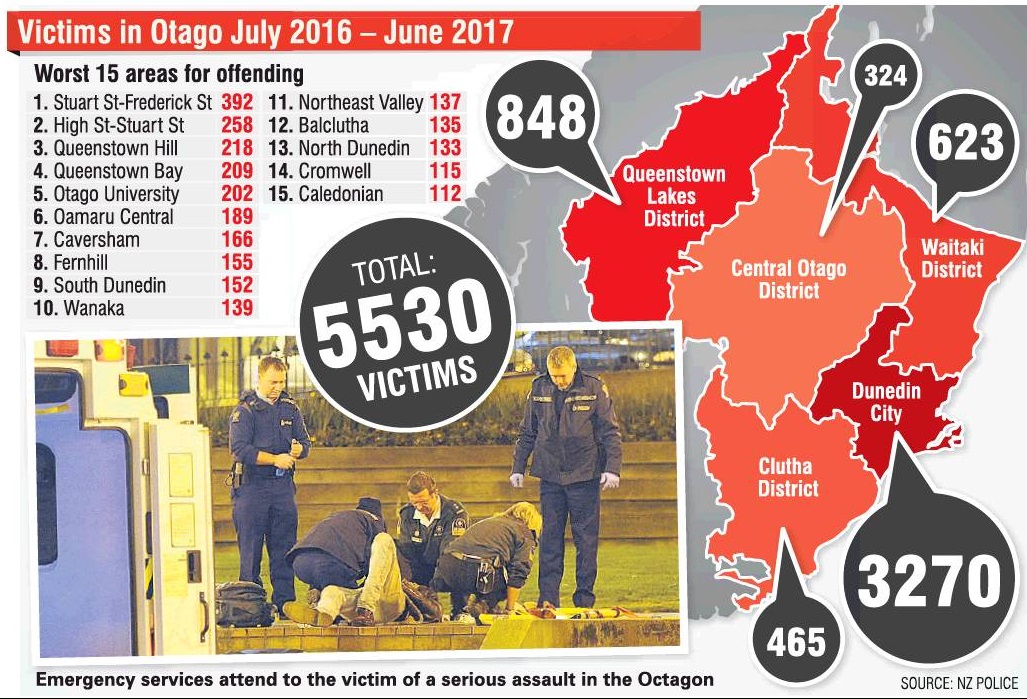
Police victim statistics for the 2016-17 financial year reveal the most dangerous areas in Otago were Dunedin’s central city and central Queenstown.
The in-depth statistics also show a large proportion of crime occurred between midnight and 4am on Saturday and Sunday, when police were often confronted by drunkenness.
The University of Otago and Dunedin Mayor Dave Cull both say steps have been taken to tackle the issue.
However, police have conceded that despite an improvement in the city, alcohol-fuelled rage continues to be a threat to the public and officers.
More than 5500 victims of crime reported incidents to police in Otago between July 2016 and June 2017.
Of those, 3270 were in Dunedin City and almost 50% of those took place in the CBD between the High St and the University of Otago areas.
The crimes included serious assaults, sexual attacks, thefts, robberies and burglaries.
The Stuart St-Frederick St area was the most dangerous, followed by High St-Stuart St.
Queenstown Hill, Queenstown Bay and Otago University rounded out the top five.
Recently, in response to an application for a new liquor store in central Dunedin, alcohol harm prevention officer Sergeant Ian Paulin told the district licensing committee that: ‘‘One only has to sit outside of the proposed location ... on a Saturday night and witness the alcohol-fuelled mayhem to come to the conclusion this area is not pleasant and agreeable.
‘‘Students walking past drinking from boxes of RTDs, bottles of wine or boxes of beer, large parties at student flats within a stone’s throw of this premises, vomit and urine in and around the streets are all commonplace.’’
The statistics revealed 11.6% (207) of reported crime in Dunedin occurred between midnight and 4am on Saturday and Sunday.
In the Stuart St-Frederick St area that figure climbed to 17%, the Otago University area accounted for 21.3% and in the High St-Stuart St area almost a third of all offences took place then.
Otago Coastal Area prevention manager Senior Sergeant Ben Butterfield said the link between alcohol and late-night violence was well established.
‘‘The majority of people police deal with are well-behaved. However, the small [minority] can be difficult and violent towards police and or members of the public.
‘‘These [hours, midnight to 4am] are also the highest danger times for us in terms of our staff.
‘‘The Dunedin areas are in close proximity to, or have the majority of, our licensed premises.
‘‘These areas attract a continued focus from police. This includes rostering of prevention staff to work during high-risk times.’’
Mr Cull said some of the steps taken to address the problems were shot down by the Alcohol Regulatory and Licensing Authority (Arla).
‘‘When we developed the local alcohol plan, we tried to limit the late-night hours of off-licences and we wanted to limit the number of off-licences in North Dunedin, but we were unsuccessful — Arla threw it out,’’ he said.
‘‘All of that would have helped.
‘‘I would like to see us have the ability to limit off-licence hours because preloading late at night exacerbates things.’’
He also believed ‘‘ridiculously cheap’’ alcohol was adding to the problem.
‘‘You only have to be in the Octagon on a Saturday night or early Sunday morning to realise there’s too much alcohol abuse.
‘‘I want to be clear. I’m not blaming the on-licences, because people are often drunk before they get into the city.
‘‘We know young people, particularly in the campus area, abuse alcohol to a greater extent than their peers elsewhere.
‘‘If you abuse alcohol, you are more likely to become an offender or victim of crime.’’
University of Otago proctor Dave Scott said there was evidence of young people from outside the academic community being drawn to the North Dunedin area and committing criminal offending.
‘‘North Dunedin is a unique geographic location with the highest density of 10 to 23-year-olds in New Zealand,’’ he said.
‘‘In recent years there is clear evidence that non-students coming into the North Dunedin area are involved in criminal offending that will be contributing to the statistics. The [university] has invested heavily in student and staff safety, evidenced by Campus Watch ... [and] continuously seeks improvements that will enhance student and staff safety; for example, the CCTV project that is currently working through a consultation phase,’’ he said.
Snr Sgt Butterfield believed police officers had made an impact recently despite the central city of Dunedin, and the CBD of other areas such as Queenstown and Oamaru, continuing to be a cause of concern.
‘‘When I arrived in Dunedin five years ago, it was not uncommon to have really significant injuries as a result of assaults in town. Now we don’t see the same seriousness of assaults still happening,’’ he said.
‘‘This is more than just a police issue. The community has a responsibility to contribute to its own safety.’’
Police were keen to see a local alcohol policy implemented as soon as possible, including a 3am closing time for all bars, he added.












